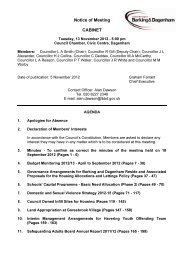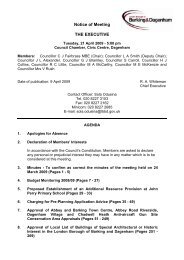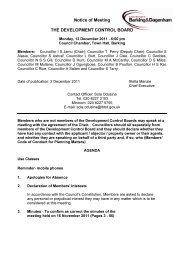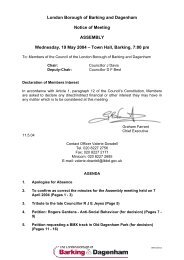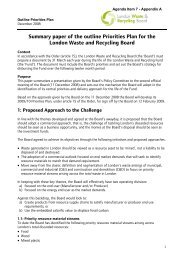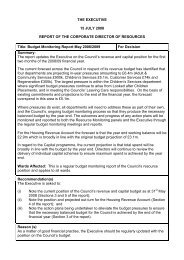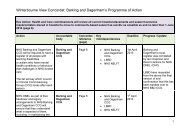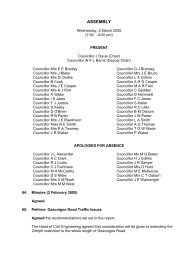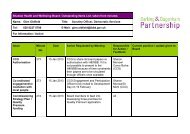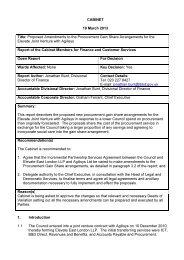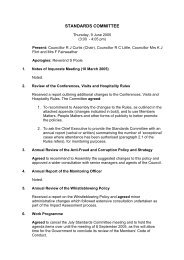Speach and Language Therapy (SALT) - Meetings, agendas, and ...
Speach and Language Therapy (SALT) - Meetings, agendas, and ...
Speach and Language Therapy (SALT) - Meetings, agendas, and ...
Create successful ePaper yourself
Turn your PDF publications into a flip-book with our unique Google optimized e-Paper software.
2.1.3 New dem<strong>and</strong>s<br />
In addition to the general upward trend in dem<strong>and</strong> there was a specific new<br />
initiative that would put further strain on the speech <strong>and</strong> language service.<br />
The Department of Health recommended the introduction of neonatal hearing<br />
screening programme that was designed to detect hearing loss at a much<br />
earlier date. Historically, therapists working in hearing impaired bases would<br />
see preschool children on initial referral, usually around three years. These<br />
children would then be placed on a monitoring <strong>and</strong> advisory caseload, where<br />
Teachers of the Deaf (TOD) would bring any concerns to the therapist’s<br />
attention, <strong>and</strong> occasional appointments were arranged where possible within<br />
the therapist’s timetable. These children would be transferred onto the<br />
therapists’ ongoing therapy caseload if they received a placement in the local<br />
resource base for hearing impaired children (Five Elms School). Funding for<br />
four extra sessions to work with deaf children was provided by Education until<br />
March 2004. This enabled the therapy service to allocate one session per<br />
fortnight to work with pre-school deaf children. However, since the funding<br />
ceased there has been no provision in place for this caseload.<br />
Implications of the neonatal hearing screening programme<br />
The government initiative for screening all newborn infants’ hearing started in<br />
Barking & Dagenham in January 2004. Children with a hearing loss are now<br />
identified within the first two weeks of birth <strong>and</strong> referred to the Hearing<br />
Impaired Services at this time. This service has referred children to Speech<br />
<strong>and</strong> <strong>Language</strong> <strong>Therapy</strong> as young as five months old, where traditionally<br />
children were referred at around 3 years. Research has shown that support<br />
<strong>and</strong> intervention for families of deaf children from professionals in the field, is<br />
crucial in the early stages of diagnosis. It has also highlighted that direct work<br />
with families is important for developing early communication skills, rather<br />
than just an advisory <strong>and</strong> monitoring role. This has significant implications for<br />
the Speech <strong>and</strong> <strong>Language</strong> <strong>Therapy</strong> service.<br />
In 1999 the NDCS asked parents about the effects of late diagnosis, <strong>and</strong> in<br />
2000 a questionnaire was distributed to parents to gather their views on<br />
newborn hearing screening. The outcome of this research showed that<br />
parents identified the following issues as being of primary importance for the<br />
provision of quality services for deaf children <strong>and</strong> their families. These<br />
included: time with professionals to underst<strong>and</strong> the implications of deafness;<br />
early follow-up appointments; well-trained <strong>and</strong> qualified staff who are deaf<br />
aware <strong>and</strong> who have empathy with, <strong>and</strong> an underst<strong>and</strong>ing of the child <strong>and</strong><br />
their family; long-term, local quality services <strong>and</strong> support.<br />
With no current funding available for preschool deaf children, the Speech <strong>and</strong><br />
<strong>Language</strong> <strong>Therapy</strong> service is unable to provide this support.<br />
In order to provide an adequate service for this caseload of children specific<br />
funding is required for preschool deaf children. The dem<strong>and</strong>s of this caseload<br />
would merit 0.5wte Speech <strong>and</strong> <strong>Language</strong> Therapist. Their time would be<br />
divided between home visits for families; intervention for the children within<br />
their preschool setting (e.g. toddler group, playgroup, nursery); joint working<br />
with other professionals (teachers of the deaf, audiology, social workers,<br />
14



